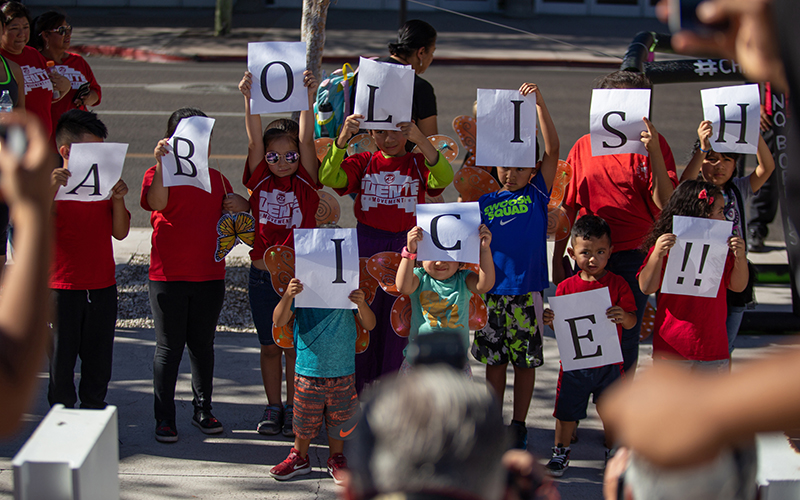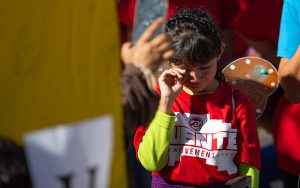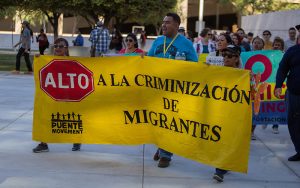
Protestors hold up an “Abolish ICE” sign, referring to Immigration and Customs Enforcement, at a Puente Arizona rally Monday in downtown Phoenix. Leaders at the rally denounced the Trump administration’s “zero-tolerance policy” of arresting all adults attempting to enter the country illegally, which requires parents to be separated from their minor children. (Photo by Nick Serpa/Cronkite News)
PHOENIX – Akemi Vargas mourns the absence of her father, deported when she was 7.
Francisca Porchas, a Puenta Arizona activist with a 2-year-old daughter, anguishes over children she says have been ripped from their families.
And social worker Laurie Rosales, who has worked in immigrant detention centers in Eloy and Florence, worries about the trauma the children are suffering in detention.
All three joined a rally in downtown Phoenix on Monday, joining a growing public outcry against a Trump administration “zero-tolerance” policy for immigrants trying to cross the border illegally. Attorney General Jeff Sessions’ “100 percent prosecution policy,” announced in May, has separated hundreds of children from their families, with Republican and Democratic lawmakers, migrant-rights organizations and others pressuring the administration to drop the practice. Nearly 2,000 children have been separated from their parents in the last six weeks, according to news media reports.
Sessions recently quoted the Bible to defend the policy, which the administration says will deter illegal border crossers unwilling to risk being separated from their children.

Akemi Vargas, 8, spoke of her father’s deportation at a Puente Arizona rally in Phoenix. “I would really like to say to him to try to come back,” Vargas said, “and that I want me and him and my family to be together.” (Photo by Nick Serpa/Cronkite News)
Akemi, whose father missed her eighth birthday because he was deported outside the U.S., cried in front of her family as other children, including her siblings, held up an “Abolish ICE” sign. Protesters destroyed a cardboard copy of a Department of Homeland Security building before marching around the Sandra Day O’Connor U.S. Courthouse, chanting “A community united will never be defeated” in Spanish.
She just wants her father.
“I would really like to say to him to try to come back, even how long it takes, and that I want me and him and my family to be together.”
Porchas, an organizer for the immigrant-rights organization Puente Arizona, called the border situation a humanitarian crisis.
“The crime that’s happening against these children feels like a crime against my own humanity, my own child, my own family,” she said at the rally in front of the courthouse. “I can’t sit idly by and watch this happen.”
Puente and a Tucson-based coalition are among the Arizona groups challenging the border-separation policy. Lawmakers on both sides of the aisle, including Arizona Senators John McCain and Jeff Flake, have called for an end to the policy. In a tweet, McCain called the policy “an affront to the decency of the American people.”
Rosales, the social worker and counselor who has worked at unaccompanied-minor and family detention centers, said separating families can traumatize children above and beyond the hardship of crossing a border.

Protesters march outside the Sandra Day O’Connor U.S. Courthouse during a Puente Arizona rally in Phoenix. The protestors spoke against what they call the inhumane treatment of immigrants. (Photo by Nick Serpa/Cronkite News)
“What we do in terms of traumatizing them is far worse than anything they’ve experienced thus far,” she said. “At least with the other hardship and adversity they’ve been in the care and love and support of their family. Here, that’s been ripped away from them.”
Rosales said that separated children put in detention centers meant for criminals places them at risk of committing suicide.
“These are lockdown facilities, so these kids have had all their rights taken from them in ways that we don’t foresee,” she said. “They’re not accustomed to the food, so they’re not eating. They often don’t sleep.”
She said in some detention facilities, because of liability issues, staff is instructed not to touch the children.
“They can’t, for example, hug them,” she said. “I really hate to see it go that route, because that’s what these kids need. They need touch and love and care.”
Connect with us on Facebook.